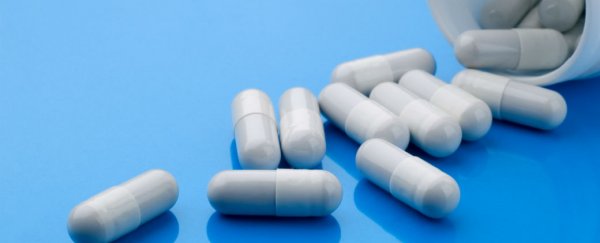The placebo effect occurs when people show improvements after unwittingly taking treatments with no active medicinal ingredients. But why do only some of us respond to these sham treatments?
New research suggests that genetic factors that alter neurotransmitter pathways in our brains might play an important role in determining who's more likely to respond to placebos.
"Because there's so much big data out there now, we can really start to see patterns associated with people who respond to placebo," Kathryn Hall, a researcher in the placebo-studies program at the Harvard Medical School in the US, told Cari Romm at The Atlantic.
Understanding what causes some people to respond to placebos, while other people don't, has been a tricky matter. Romm explains at The Atlantic:
"The answer is complicated by the fact that 'the placebo effect' is more accurately a tangle of interrelated effects, all of which are still closer to theory than to scientific fact. Some studies have shown that personality traits, like thrill-seeking and altruism, may have something to do with it. Other scientists say that the ritual surrounding the medicine - the explanation, reassurance, and simple human connection that a doctor can provide - may be as powerful as actually taking the sugar pill, or the saline solution."
But the the development of sophisticated neuroimaging technologies over the last decade has helped reveal new clues about how the brain's neurotransmitter pathways respond to placebos.
"Because they are the chemical messengers that either excite or inhibit nerve function in the brain, many neurotransmitters play key roles in reward and pain," explains Hall. "We hypothesised that genetic variation in the genes that encode the proteins in these neurotransmitter pathways might also modify placebo responses."
Her team has identified a network of 11 genes that appears to influence the pathways through which neurotransmitters, such as dopamine and serotonin, move through the brain.
In a study, published in the journal Trends in Molecular Medicine, her team suggests that variants of these genes acting on certain pathways could influence responsiveness to placebos. While it's still in the early stages, the research could help guide future clinical trial designs for new drugs.
"The study of genomic effects on the placebo response - what we call 'the placebome' - is in its infancy, but there is already ample evidence that genetic variations in the brain's neurotransmitter pathways modify placebo effects," Hall said in a press release.
"As a result, placebo responses are emerging as a legitimate series of biological reactions that must be rigorously characterised for efficient pharmaceutical development and optimal patient care."
In 2012, Hall identified the first placebo biomarker, the catechol-O-methyltransferase (COMT) gene, which regulates the amount of dopamine in the brain, a molecule linked to pain and also the pleasure we feel from receiving rewards.
They tested for this biomarker in a study on people with irritable bowel syndrome, published in PLOS One.
Participants were divided into three groups: one group was told they were on a waiting list for treatment, another was given a fake acupuncture treatment by a listless doctor, and the third group received the fake treatment from a more responsive, concerned practitioner, who spoke confidently about the treatment. The researchers were interested in whether their results would be impacted by having the doctors act out different roles.
In the follow-up, the participants were asked to rate how much their symptoms had improved, and were tested for the COMT gene. The team found that participants with the high-dopamine producing variant of the gene were more likely to report relieved symptoms after receiving the placebo.
Source: The Atlantic
